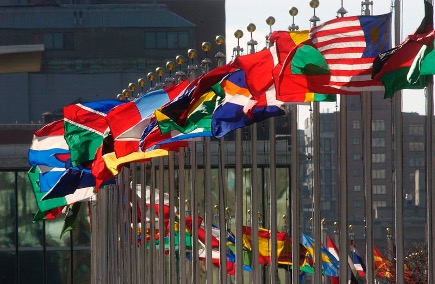Yesterday, the 24th of October, was United Nations Day. The day celebrates the anniversary of the entering into force of the UN Charter back in 1945. More than 75 years after its founding, the institution is usually described as important but somewhat dysfunctional and in dire need of reform. Its structures, so the argument, were created in a different time and reflect an outdated reality — a view that I do not entirely agree with. In some regards, the UN have changed a lot since they were founded. And in some regards, the world today is remarkably similar to the way it was in 1945.
The most obvious change in the UN is its growth from 51 member states at its founding, to 193 today. Formerly colonized countries gained independence in the 1950s and 1960s and joined the organization, which led to a shift in majorities that is most notable in the UN General Assembly. Decisions taken there are not binding, but they do still carry symbolic weight. The UN Security Council has changed much less, but it too has seen an increase in non-permanent membership after 1965 — even the permanent members are not all the same ones they were in 1945, as the People’s Republic of China took over the seat of the Republic of China (i.e. Taiwan) in 1971. The decision was made by the General Assembly, which also elects non-permanent members to the body according to regional quotas.
Another change is a shift, or rather an expansion, in the topic areas the UN are active in. The primary purpose of the organization is to ensure peace and security. The fact that there still is conflict in the world is not proof that it has failed at this. As a much-overused quote by former UN Secretary General Dag Hammarskjöld says, “the United Nations was not created in order to bring us to heaven, but in order to save us from hell.” Considering that resources for UN Peacekeeping are notoriously low — the budget for the current fiscal year is $6.38 billion, about the same as the GDP of Malawi and less than 0.5% of global military expenditure — individual missions, too, are underfunded and understaffed and what they can do is limited. At the same time, peacekeeping is only a small aspect in the portfolio of activities undertaken by the UN. In the past decades, it has widely increased its work in areas such as emergency relief, development and climate change.
The problems the UN runs into with these topics is that it is organized by states, yet challenges that are of a global nature need global solutions. While nations and states are not the same — even though the terms are often used synonymously, contemporary states derive their legitimacy from a nation. Neither state nor nation are fixed, and the changes in UN membership show that the organization can adapt when such changes occur, albeit slowly. The reason the state-based structure of the UN can be a hindrance in solving global problems is therefore not necessarily one of representation, but one of accountability. The UN does not have sovereignty in the same way states have: while the Security Council can impose sanctions and the International Court of Justice can issue judgements against member states, these decisions cannot be backed up through executive power the same way they would in a sovereign state.
As long as the organization cannot hold individual member states to account, there is only so much it can do. In our international system, state sovereignty runs supreme, and this is no different than it was in 1945. As a result, the United Nations can only be successful if its member states are committed to use its institutions to solve problems and abide by its agreements. Or, more radically but also more effectively, states would have to give up at least some of their sovereignty to equip the UN with more power and more capabilities to enforce that power.

